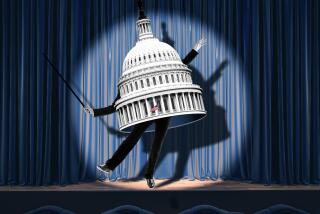GOP Has a Song for NEA: Taps : Some congressional Republicans seek to abolish federal arts endowment
- Share via
What kind of art should our hard-earned tax dollars go to support, traditional American folk art or sexually explicit avant-garde art? “Neither,” the new Republican majority in the House seem poised to answer. That’s a shame.
Two years ago, the arts-funding question was shaped by the scandal of Andres Serrano’s “Piss Christ,” Robert Mapplethorpe’s homoerotic photographs and Karen Finley’s nude performance art, all of which had enjoyed some degree of support from the National Endowment for the Arts. But even though the Supreme Court struck down a “decency clause” that the NEA imposed under pressure, the entire controversy subsided as the federal agency, under the leadership of Jane Alexander, simply exercised better discretion in selecting artworks to endow.
This year, however, the philosophical ground has shifted. The House Republican leadership wants to abolish the NEA on principle. Its claim, a familiar conservative one, is that, in the words of House Majority Leader Dick Armey (R-Tex.), “there is no constitutional authority for this agency to exist.” This year, as a result, federal funding for all art is in equal jeopardy, including funding for such mainstream, old-fashioned arts festivals as “Masters of the Folk Violin” and “Masters of the Steel String Guitar,” both sponsored by the National Council for Traditional Arts.
Plain-folks art does not cost as much money as fancy-folks art. Putting together an evening of “Sacred Harp Singing,” another NCTA effort, or the annual “Cowboy Poetry Gathering” does not cost as much as mounting a great classical ballet. But it doesn’t come free, either, and the NEA has spent much of its modest appropriation as seed money: small matching grants and other sensible efforts to help groups like the NCTA, Chicago’s Old Town School of Folk Music and Los Angeles’ Craft and Folk Art Museum find their way to private support.
The argument that there is no constitutional authority for an educational agency such as the NEA rests on the truth that the Constitution makes no provision for public education of any kind. If from that fact we must infer that there can be no funding for an arts endowment, then there can also be none for a National Endowment for the Humanities, a National Science Foundation or any other federal initiative in higher education.
Armey and the Republican majority can argue against funding the NEA even if the constitutional authority for the agency exists. But if and when they do so, we hope they will not pretend that only a wealthy elite has been served by the NEA, for the opposite is the case. Through the NEA, the spirits of millions of ordinary Americans have been lifted through the traditional craft, song and story of their native land. Those Americans will be spiritually poorer, and the American tradition weaker, if the budget line of the NEA is spitefully reduced to zero.
More to Read
The biggest entertainment stories
Get our big stories about Hollywood, film, television, music, arts, culture and more right in your inbox as soon as they publish.
You may occasionally receive promotional content from the Los Angeles Times.










